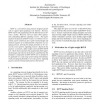Free Online Productivity Tools
i2Speak
i2Symbol
i2OCR
iTex2Img
iWeb2Print
iWeb2Shot
i2Type
iPdf2Split
iPdf2Merge
i2Bopomofo
i2Arabic
i2Style
i2Image
i2PDF
iLatex2Rtf
Sci2ools
AINA
2003
IEEE
2003
IEEE
Towards RSVP Lite: Light-Weight RSVP for Generic Signaling
RSVP is a reservation setup protocol designed specifically to support QoS signaling in the Internet. However, RSVP end-to-end signaled QoS for the Internet has not become a reality. Moreover, there are many other applications demanding different signaling services. This paper analyses the features of RSVP version 1 we believe to be essential, and its complexity due to QoS-oriented design and multicast support as an indispensable component in a signaling protocol, deriving the design principles to be covered in a more generic signaling protocol. Based on this analysis, we present a light-weight version of RSVP, RSVP Lite, which clearly separates the signaled data from signaling messages and removes the multicast capability from the mandatory components of RSVP. RSVP Lite is intended to be applicable to a wide range of networking environments, while providing the flexibility to serve for generic signaling purposes and incremental deployment in the Internet.
| Added | 04 Jul 2010 |
| Updated | 04 Jul 2010 |
| Type | Conference |
| Year | 2003 |
| Where | AINA |
| Authors | Xiaoming Fu, Cornelia Kappler |
Comments (0)

